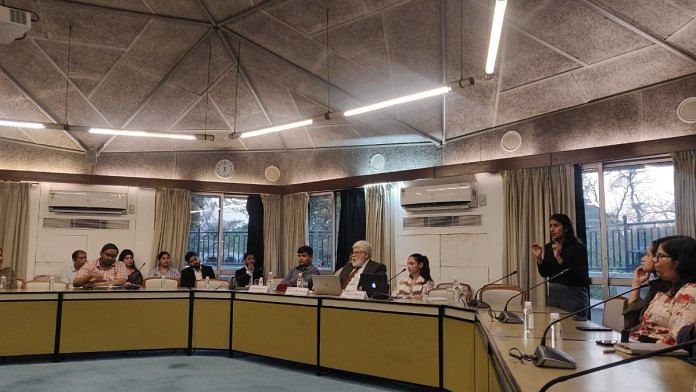New Delhi: A strictly legal discussion on a recent evening in Delhi had more than one ingredient for generating headlines—a judge who likes to speak his mind and his chance to wade in the Adani-Hindenburg judgment. The judge chose to stay his course, sticking to the discussion on ‘Group of Companies’ doctrine but not without commenting on the issue of intolerance toward criticism of judgments in India.
“One of the things we lack in India is criticism of judgments. Academic criticism of judgments, if absent, is a deterrent to the growth of the judiciary. So there must be a climate which is developed where we have students and others, who critically appraise judgments,” said Justice Sanjib Banerjee, former Chief Justice of the Meghalaya High Court, recalling that the US Supreme Court judges stay up the night before the Harvard Law Review is published.
“Because sometimes the attack is so scathing, (that) in India you would take it up as contempt,” said Banerjee, speaking at the second lecture in a ‘Great Cases’ series being conducted by the Vidhi Centre for Legal Policy at the India International Centre. Others in the company of the former judge were Arghya Sengupta, founder of Vidhi and Varsha Banta, Research Fellow, Corporate Law at Vidhi.
Justice Banerjee, known for lambasting the Election Commission of India for not acting against political parties violating Covid protocols in 2021 and observing that the poll body be booked “on murder charges…”, didn’t step out of his role at the Vidhi event and refrained from commenting on issues he is generally vocal about — be it his stand on corruption in judiciary or his remarks against the ECI. Instead, he just took the audience through the evolution of the ‘Group of Companies’ doctrine, with the ease of a seasoned academic and practitioner of law.
In December last year, a five-judge bench of the Supreme Court pronounced a judgment that cleared the uncertainty surrounding the doctrine in India. It held that even non-signatory group companies can in principle be bound by arbitration agreements, if they fulfill certain conditions. The Vidhi discussion, based on this judgment, saw the citing of practical examples to explain the doctrine. Even the mention of the Adani Group as an example wasn’t enough to lure in Justice Banerjee. The latter stuck to the law and said his piece.
Also read: IM Lall stood up to the British, shaped laws protecting civil servants. But it came at a cost
Dejargonising arbitration
At the IIC discussion, Justice Banerjee managed to break down a complex arbitration concept into bite-sized examples for everybody to be able to take a piece home. The 50-odd people at the gathering were mostly legally trained professionals, some of whom had dived into the legal policy space, while others were trying their skills in court corridors.
The former high court judge spoke about the doctrine, gave examples, and made the audience chuckle all at once.
He explained that for the doctrine to be applicable, it depends on the facts of any case. And then went on to posit a scenario to make his point even clearer.
“Let’s say, a large conglomerate has several associate concerns, some of which may be companies, some of which may be different kinds of entities. The principal work is to be done by one of the arms of the large conglomerate with a third party. If that transaction envisages some associate work being done by others which are connected to that conglomerate, then all of them would get bound by the arbitration agreement. But if that is not envisaged in the transaction and in the course of the transaction, assistance is taken from some of the other associates, incidentally or accidentally, that would not bind those associates to an arbitration agreement,” he said.
He asserted that it all depends on how a transaction is designed, what it is intended to do, and how it is conducted. The judge also managed to interact with the audience while giving these examples.
Intention, he said, is very difficult to ascertain on the facts of any case. “What you may be thinking madam, while you are gazing at me, you could be thinking about flying a kite…So intention is something like that. I have to get into your mind…and ascertain whether you intended to do or not do a certain thing,” he added.
Also read: Who robbed India’s tribes of language, livelihood? Not Vedas, Upanishads, but British laws
When Adani was mentioned
At one point during the discussion, Sengupta also chimed in, saying that he sees the fundamental thrust of the Supreme Court judgment as going beyond the concept of “separate legal personality”, if intent and conduct of the parties warranted. He brought up the Adani-Hindenburg judgment, and without going into the merits of the case, spoke about the structuring of the Adani Group, in terms of the number of entities, all of which were closely held.
“Whether you take the Adani case or whether you take the Tatas in the way in which they are structured…I’d like you [Banerjee] to say a little bit more in terms of how you think the principle of separate legal personality needs to be modulated in a country where there is such a large proportion of very closely held family-run businesses,” Sengupta asked. However, in response, Justice Banerjee stuck to the law, explaining the concept of shareholder driver companies, as against family or individual-driven companies.
The joy of being able to discuss a purely legal and complex subject was visible on Banerjee’s face throughout the discussion which lasted for over 90 minutes.
(Edited by Theres Sudeep)



